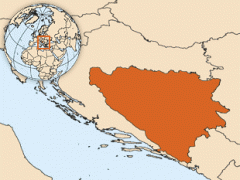Behind the Gloss of Economic ‘Progress’ in Bosnia-Herzegovina
Bosnia-Herzegovina, 2013: there are statistics on the economy, and there are the visible facts. Neither paint a happy picture.
According to the World Bank, ”the onset of the global finanical crisis in late 2008 is having an ongoing negative impact on the economy of Bosnia-Herzegovina (B&H) and the country is now in the midst of a double dip recession. Inflation returned to the country in 2011, with higher international food prices contributing to a rise in food prices.” Likewise, a recent working paper by Naida Trkić-Izmirlija and Adnan Efendić found that the global economic crisis has led to increased income inequality in B&H.
A struggling economy, inflation, and inequality may not sound unique in the context of the region, but Bosnia’s situation is aggravated by other social and political issues unique to a post-war, post-socialist context. An extremely complicated state structure with two entities and two administrations is one of them. As Goran Miraščić, an economic policy advisor in Bosnia-Herzegovina, wrote: ”While there are many countries in Southeastern Europe with economic and historical backgrounds similar to that of Bosnia-Herzegovina, the complexity of the economic and political structures integral to a nation created by the joining of two autonomous entities contributes to many unique economic conditions.”
This is the abstract view. As a resident of Sarajevo, what I witness tells more about how the situation is influencing the daily lives of the country’s citizens. And it looks something like this:
More and more homeless people spend their nights on the street. More and more cases of people unable to afford medical care appear in the newspapers and on social media. Teenagers feel that their dreams are unattainable in their own country. Young people with bachelors and masters degrees who speak several foreign languages are unable to find suitable work. NGOs and firms offer more contract-based jobs than permanent full-time work, yet even such temporary jobs are at a premium because there aren’t many alternatives. And you can also see elderly people with meager pensions digging through trash bins on street corners.
At the same time, new shopping centers are springing up like mushrooms. New private universities with fancy campuses offer pricey degrees to foreigners and the country’s elite. New housing and business complexes soar upwards into the sky. And foreign companies come to mine the country’s natural resources, with very few benefits to local communities in spite of all their lavish promises. The Golden Arches came to Bosnia a few years ago, and very soon another notorious golden icon, Shell, will be coming to ”explore” here, too.
Such superficial signs of economic growth may be beacons on hope to some in an otherwise dark economic landscape. In reality, they are mirages of true progress: empty signifiers that things are improving. And you don’t need to look deep to reach this conclusion. All you need to do is simply talk to an average citizen: the situation of the majority of people remains unchanged or in some cases has only gotten worse as economic globalization (and its global economic crisis) has grown. Those who are already well-positioned to ride the wave ride high while others sink further into cycles of poverty and debt. Those in the increasingly vulnerable middle class continue to hold tight onto whatever security they have left in a post-war, transitioning country, or turn to find education or work opportunities abroad, draining the country of its talent and creativity.
The incredibly beautiful landscape of B&H─rolling green hills, majestic limestone cliffs, and gushing freshwater streams and rivers─still looks intact and eternal, and is a welcome contrast to an otherwise bleak situation. But even the natural landscape is rapidly becoming the next victim of a market always eager to exploit or pollute what is most readily available. Needless to say, reckless exploitation of natural resources will not help future generations of Bosnians to enjoy a more prosperous life.
Exacerbating the situation is the fact that the leading global financial model─American-style capitalism─ tends to define progress in terms of short-term gains rather than long-term sustainability. The Financial Times Lexicon offers a description which captures the essence of this economic philosophy in a nutshell: ”Anglo-Saxon capitalism is said to emphasize the interests of shareholders, rather than other stakeholders such as employees. Its critics say that it emphasizes short-term profits at the expense of long-term planning.”
Fixation on short-term gains and shareholder profits is especially catastrophic for a country in transition, where the economic condition of the majority of citizens is particularly fragile. Such thinking encourages greed, corruption, and ruthless self-interest – which of course does not help those who need stability the most.
Even if the numbers, or the lights of new high rise buildings, seem to reflect ‘growth,’ we have to ask ourselves: who is benefiting from it? Most Bosnians I know are not fooled: they ask themselves this question every day, and they are not happy with the answer.
One measure of hope in an otherwise grim situation is the growing global and local awareness that those at the top of the pyramid have taken too much for far too long. Still, the question remains as to how to address this situation in the unique political and economic context of Bosnia-Herzegovina.
Tags: Bosnia-Herzegovina, Development, economic growth, economy, employment, globalization, politics, Sarajevo, sustainability


